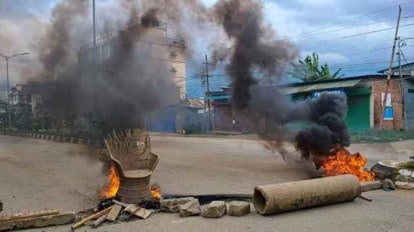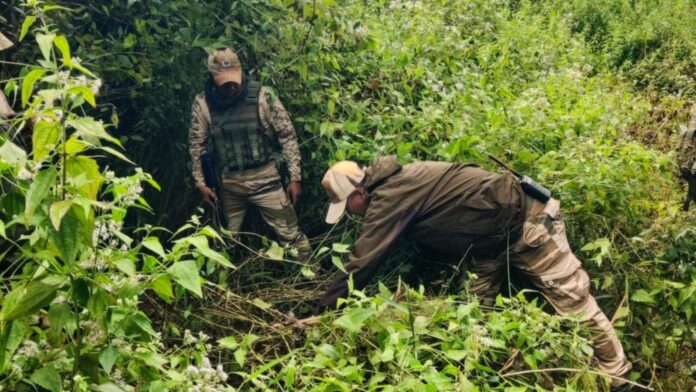In a stark reminder of the volatile and escalating conflict in Manipur, the bodies of two Meitei men were found in the troubled district of Jiribam on Tuesday morning, following an intense gunfight between suspected militants and security forces the previous day. The violence, which also saw ten suspected Hmar militants shot dead by security forces, has left the region tense and the community fearful. Six individuals from the Meitei community, including three children, remain missing, with their families and local organizations urging swift action from authorities.
The deadly encounter occurred in the Jakuradhor and Borobekra areas of Jiribam, close to the Hmar-majority Pherzawl district. This region has been a flashpoint of ethnic tension, with periodic eruptions of violence over the past several months. Monday’s conflict reportedly began when militants attacked a Central Reserve Police Force (CRPF) post and the nearby Borobekra police station, sparking a fierce retaliation from security personnel. According to locals, the suspected militants also targeted Meitei homes and shops, heightening fear and unrest in the area.
The Victims and Their Struggle for Safety
Early on Tuesday, police identified the two deceased men as 61-year-old Laishram Barel Singh and 75-year-old Maibam Keshwo Singh. The men had been among ten individuals residing in a relief camp at the Borobekra police station, seeking shelter from the violence that has plagued the region since June. Their deaths have cast a pall of grief over the camp and stoked fears for the safety of the remaining six missing individuals, all from the same family—a grandmother, her two daughters, and her three grandchildren, the youngest less than a year old.
A local resident, Yurembam Sanjoy Singh, recounted the harrowing scene: “During the day, people in the relief camp would venture out for basic needs. But when the firing and arson started on Monday, everyone scattered in panic. By the time the shooting subsided, we discovered that ten people from our camp were missing. It was only this morning that we found the bodies of two men, and another two were found with injuries. But six are still unaccounted for, and we are terrified about what might have happened to them.”

The Unbearable Reality for the Displaced
Sanjoy, like many others in the camp, had fled from nearby villages months earlier to escape the mounting violence and now finds himself in a situation of insecurity even within the “safe” confines of the relief camp. The community’s precarious situation is further complicated by the region’s topography and social dynamics; any attempt to flee Jiribam for safer areas would mean crossing through tribal-majority zones where Meiteis are vulnerable to targeted violence.
N Rajendro Singh, another resident of the relief camp, expressed the collective anxiety of the displaced: “We have nowhere to go. If we try to escape to the main Jiribam town where it’s safer, we risk being attacked on the way by tribal groups. We’re practically trapped here.”
Demands for Immediate Action and Justice
The incident has sparked outrage among the Meitei community, with Jiri Apunba Lup, a local organization representing Meiteis in Jiribam, calling for urgent government intervention. In a public statement, the group alleged that the missing individuals had been abducted by militants during the attack on Monday. They issued a 24-hour ultimatum, demanding that the authorities locate and rescue the missing persons and punish those responsible for the abductions.
“The government must act immediately to secure the safe return of our family members. If the authorities fail to do so, the people of Jiribam will resort to strong measures of protest,” warned the organization in a strongly-worded statement.
-1731407287724.webp)
Rising Tensions and Allegations of Retaliation
Monday’s clash, which resulted in the highest single-day death toll in the ongoing conflict this year, has intensified tensions across the region. Just a few days prior, a 31-year-old Hmar woman living near Jiribam’s district headquarters was killed in an attack on her village. According to Hmar community leaders, the militants involved in Monday’s skirmish were “village volunteers” retaliating for the woman’s killing, though authorities describe them as armed insurgents.
In a press conference on Tuesday, IGP (Operations) I K Muivah provided further details on the encounter, describing how security forces were compelled to respond with force due to the use of sophisticated weaponry by the assailants. After the exchange of fire, security personnel recovered a significant cache of arms from the militants, including three AK-47 rifles, four Self-Loading Rifles (SLRs), two INSAS rifles, and a rocket-propelled grenade launcher.
“Our standard protocol is always to caution militants to cease fire. However, when faced with high-caliber weapons, our forces have a duty to protect themselves and the civilians they are assigned to defend. In this case, our response was necessary to neutralize the threat posed by heavily-armed assailants,” Muivah explained. He further added that an FIR had been lodged, and reinforcements from the CRPF, Assam Rifles, and civil police were conducting combing operations in the Jakuradhor area to restore order.
Kuki-Zo Community Responds with Backlash Against CRPF
In the wake of the violence, the Kuki-Zo community has accused the CRPF of using excessive force, fueling existing mistrust between the state’s various ethnic groups and the security forces. The Kuki Students’ Organization (KSO) issued a statement on Tuesday, barring CRPF personnel from venturing beyond their camp premises in Kuki-Zo majority areas. “Until the CRPF publicly acknowledges and apologizes for their barbaric actions in Jiribam, any personnel found outside their designated camps will be doing so at their own risk,” the KSO warned in their statement.
Police Defend Actions, Labeling the Incident as Retaliatory
To address the growing criticism, the police released a statement late Tuesday night, clarifying that the security forces’ actions were in direct response to an unprovoked attack by heavily-armed militants. According to the statement, the deceased militants were not locals but were from the distant districts of Churachandpur and Pherzawl, suggesting a premeditated incursion into Jiribam to instigate violence.
“These militants were not residents of the area. They traveled a considerable distance from Churachandpur and Pherzawl districts to conduct these attacks, indicating a planned assault,” read the police statement. The authorities stressed that their response was proportionate to the level of threat posed by the intruders, who reportedly targeted civilians and police personnel indiscriminately.

A Community in Despair and a Region on Edge
The unfolding tragedy in Jiribam underscores the fragile nature of peace in Manipur, where ethnic tensions and long-standing grievances continue to erupt into violence. For the families of the missing six, each passing hour is a grim reminder of the dangers they face simply for being part of a vulnerable community in a conflict zone. As the police intensify their search operations, the community remains gripped by uncertainty, hoping for the safe return of their loved ones but fearing the worst.
With regional organizations demanding accountability and justice, and the police asserting their duty to protect civilians, the events in Jiribam highlight the complexity of maintaining peace in a region riddled with ethnic divisions and a history of violent confrontations. The people of Manipur, caught between the violent factions and security forces, are left yearning for a lasting resolution that seems perpetually elusive in this cycle of hostility and bloodshed.

